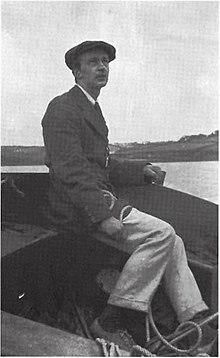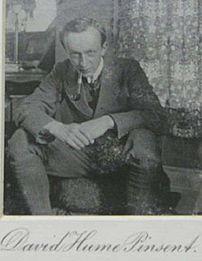David Pinsent | |
|---|---|
 | |
| Born | David Hume Pinsent 24 May 1891 |
| Died | 8 May 1918 (aged 26) |
| Cause of death | Plane crash |
| Nationality | British |
| Education | Trinity College, Cambridge (First-class Honours, Mathematics) |
| Occupation | Test Pilot at Royal Aircraft Establishment, Farnborough |
| Family | David Hume |
David Hume Pinsent (/ˈpɪnˌsɛnt/; 24 May 1891 – 8 May 1918)[1] was a collaborator of the Austrian philosopher Ludwig Wittgenstein. Wittgenstein's Tractatus Logico-Philosophicus (1922) is dedicated to Pinsent's memory.[2][3]
Early life
Pinsent, a descendant of philosopher David Hume's brother, was born in Edgbaston, Birmingham. He gained a first-class honours degree in mathematics at Cambridge University, where he was described by George Thomson, future master of Corpus Christi College as "the most brilliant man of my year, among the most brilliant I have ever met".[4] Pinsent then studied law.[1]
Career
He met Wittgenstein, two years older, as an undergraduate at Trinity College, Cambridge in 1912.[1] He acted as Wittgenstein's subject in psychological experiments on rhythm in speech and music, and he struck up a rapport, based on shared interests in music and mathematics.[1] That led to holidays together, including trips to Iceland and Norway, which Wittgenstein paid for.[5] His diary (1912–1914) mentions his times and travels with Wittgenstein.
First World War
During the First World War, Pinsent was deemed unsuitable for active military service. He trained as a test pilot instead and worked at the Royal Aircraft Establishment in Farnborough, where he was killed in a flying accident in May 1918.[1]
References
- ^ a b c d e Loners: The Life Path of Unusual Children Sula Wolff, 1995, p. 161, Books-Google-161.
- ^ Galison, Peter Louis; Roland, Alex (2000). Atmospheric Flight in the Twentieth Century. Springer. p. 360. ISBN 0-7923-6037-0.
- ^ Goldstein, Laurence (1999). Clear and Queer Thinking. Rowman & Littlefield. p. 179. ISBN 0-8476-9546-8.
- ^ Kölbel, Max (2004). Wittgenstein's Lasting Significance. Routledge. p. 150. ISBN 0-415-30517-9.
- ^ "Ludwig Wittgenstein: Cambridge". Cambridge Wittgenstein Archive. Archived from the original on 2008-02-22. Retrieved 2008-02-28.
External links
- Sunningwell War Memorial — Brief biography of David Hume Pinsent
- Wittgenstein Chronology - Chronology of Ludwig Wittgenstein's life, with summaries of Pinsent's diary entries for the times they spent together.
